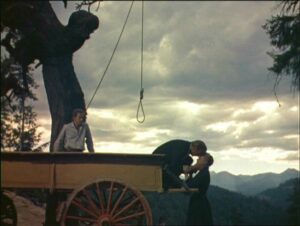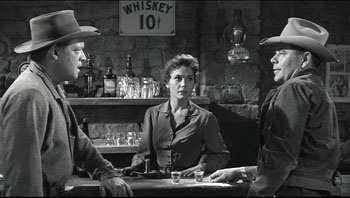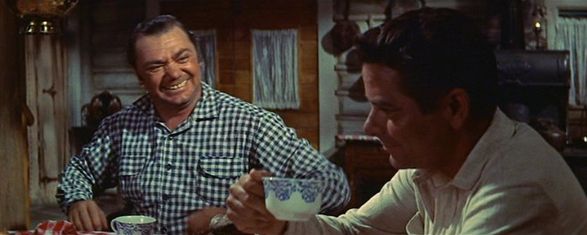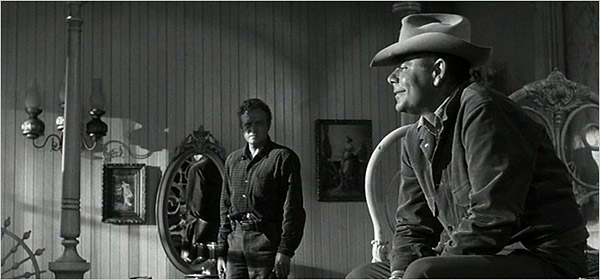Written for my En movimiento column for the September 2013 issue of Caiman Cuadernos de Cine. Reseeing The Hanging Tree tonight, I was fascinated to discover how much McCabe and Mrs Miller was indebted to its prostitutes and its fires, and how often Daves could use a crane as if it were a musical instrument.— J.R.
“Many of Delmer Daves’s films are beloved, but to say that he remains a misunderstood and insufficiently appreciated figure in the history of American movies is a rank understatement.” This is how critic Kent Jones begins the second of his two essays accompanying the simultaneous Criterion releases on DVD and Blu-Ray of Jubal (1956) and 3:10 to Yuma (1957), the first two in a string of three Westerns that Daves made with Glenn Ford. (The third was Cowboy in 1958.)
I saw the two Blu-Rays, in reverse order, on the same day, and I agree entirely with Jones that 3:10 to Yuma (ignoring its reportedly lamentable recent remake) is a remarkable achievement — as much for Glenn Ford’s performance as a charismatic villain as it is for the diverse dramatic and visual nuances of Daves, working in black and white and widescreen. Speaking as someone for whom Glenn Ford’s heroism in my youth was as important as that of James Stewart or Cary Grant, I was also astonished by the unpredictable and multileveled killer-hipster and delicate gangleader-womanizer he creates here (and also grateful for a fascinating interview with his son and biographer Peter Ford, included as a bonus). Part of Jones’s argument in both essays hinges on Daves’s background as a knowledgeable westerner (which includes his sensitive feelings towards minorities — a virtue that we learn from Peter Ford was shared by both his parents, Glenn Ford and his first wife, Eleanor Powell).
I’m less certain about the virtues of Jubal, even after factoring in the difficulties that Jones acknowledges regarding Rod Steiger’s strident villainy and Daves’s inability to cope with malice, problems which he perceives as the necessary “trade-off” once one accepts Daves as “an absolute rarity in cinema, an artist of the good,” a beacon of positive thinking in a branch of macho filmmaking ruled by stoical cynicism (Anthony Mann), romantic desperation (Nicholas Ray), and/or clubhouse snobbery (Howard Hawks). The film certainly has its strengths — including CinemaScope landscapes (this time in color) and Ernest Borgnine’s rich performance as a rancher in whom vulgarity and good-natured gusto seem inextricably intertwined — but once its excessive melodrama takes over, I found it close to unbearable.
I’m grateful, in any case, for Jones making such a strong critical case for Daves. He’s a filmmaker whose power has deeply affected me ever since I saw and was virtually traumatized by his 1951 remake of King Vidor’s Bird of Paradise at the age of eight. For decades, I’ve been trying to reconcile this unmistakable power — also present in such diverse films as Dark Passage (1947) and The Hanging Tree (1959), as well as his coauthored script for the 1939 Love Affair — with his parallel reputation as a purveyor of camp excess and innocent kitsch in such late works as Spencer’s Mountain (1963) and Youngblood Hawke (1964), which arguably may have already been apparent to some adults who saw Bird of Paradise a decade earlier.
The issue, one might say, isn’t only that Daves has been seriously underrated for his best work, but also that his worst work has cast these achievements in an unjustly unfavorable light. Film artists should be judged by their best films, and Mann’s Serenade, Ray’s Flying Leathernecks, or Hawks’s Sergeant York certainly don’t undermine the strengths of The Naked Spur, Johnny Guitar, or Rio Bravo. The difference in Daves’s case is that there might actually be more Youngblood Hawkes in his oeuvre than 3:10 to Yumas.
Yet this shouldn’t mean overlooking a masterpiece such as 3:10 to Yuma as a consequence. As Jones’s acute analysis demonstrates, Daves shows an emotional handling of space that is perfectly matched by his profound sense of human interaction, between a man and wife as well as between a deputy and a gang leader.





